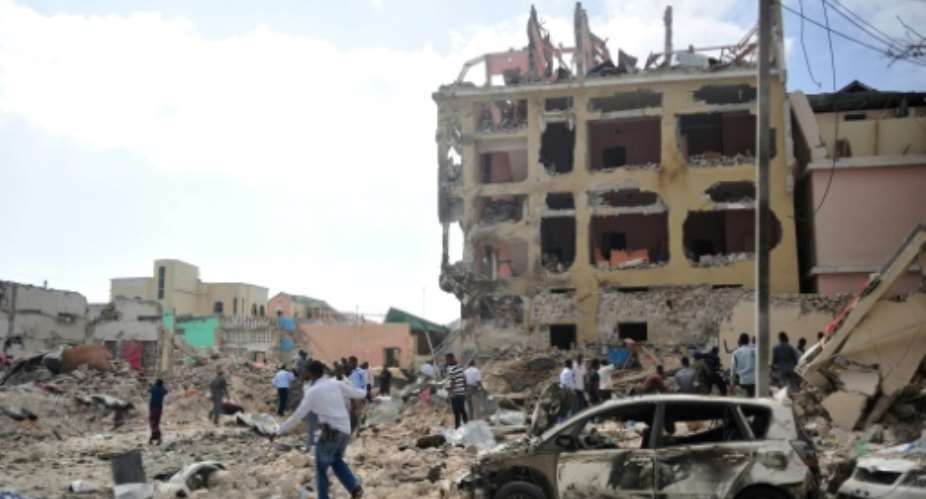Mogadishu (AFP) - Some 20 people were killed on Sunday when a car packed with explosives blew up near a busy intersection in the Somali capital Mogadishu, officials and witnesses said.
"A suicide car bomber blew himself up inside this market at a busy time, killing at least 20 people and many others were also injured," said Ahmed Abdulle Afrah, the district commissioner of Mogadishu's Wadajir district.
Witnesses said the bombing targeted an intersection in the area to the city's south where soldiers, civilians and traders were present.
"There were many small-scale traders alongside the road and teashops and restaurants. There were also members of the security forces and shoppers and the blast was so huge that it killed nearly 20 people, most of them civilians," said witness Sumayo Moalim.
A local security official earlier said at least 14 people had been killed and some 30 wounded. Final death tolls in such attacks in Somalia are often difficult to establish.
 Somalia conflict
Somalia conflict
The explosion is the first big attack in the Somali capital since the election of new President Mohamed Abdullahi Mohamed -- nicknamed Farmajo -- although several mortar blasts claimed by Al-Shabaab Islamists marred the official handover of power last week.
The blast brought international condemnation, with the European Union describing it as "yet another act of terror targeting the Somali people by those wanting to undermine progress towards a stable and secure Somalia".
The bloc added it stood behind President Farmajo's efforts to bring security to his nation and build strong institutions.
The latest attack underlines the challenge facing the new president, who has inherited an administration with limited control over Somali territory due to the presence of Shabaab, and is heavily propped up by the international community.
'I will need time'
Farmajo's inauguration takes place on Wednesday, although he officially took office this week at a ceremony marred by a series of mortar strikes near the presidential palace which left two children dead.
AU troops drove Shabaab militants out of Mogadishu in August 2011 but the fighters continue to control rural areas and launch repeated attacks in the capital.
In the week before the election on February 8 at least 28 people were killed when Shabaab struck a popular hotel in the capital.
And jitters over security meant MPs gathering to elect Farmajo last week had to meet in Mogadishu's heavily secured "green zone"-style airport compound.
Farmajo, whose brief stint as prime minister in 2010-11 showed him to be a no-nonsense leader set on improving governance and cracking down on corruption, is hugely popular in Somalia.
But turning around one of the world's foremost failed states will be no easy task.
"I need the Somali public to understand how much the government is in need of their support. Government will need enough time to address things," the president said during the handover ceremony.
Somalia's limited election process, in which only several thousand delegates voted for lawmakers, is seen as a step toward full democracy for the country.
Somalia has not had an effective central government since the collapse of Siad Barre's military regime in 1991, which led to civil war and decades of anarchy.





 Lay KPMG audit report on SML-GRA contract before Parliament – Isaac Adongo tells...
Lay KPMG audit report on SML-GRA contract before Parliament – Isaac Adongo tells...
 Supervisor remanded for stabbing businessman with broken bottle and screwdriver
Supervisor remanded for stabbing businessman with broken bottle and screwdriver
 NDC watching EC and NPP closely on Returning Officer recruitment — Omane Boamah
NDC watching EC and NPP closely on Returning Officer recruitment — Omane Boamah
 Your decision to contest for president again is pathetic – Annoh-Dompreh blasts ...
Your decision to contest for president again is pathetic – Annoh-Dompreh blasts ...
 Election 2024: Security agencies ready to keep peace and secure the country — IG...
Election 2024: Security agencies ready to keep peace and secure the country — IG...
 People no longer place value in public basic schools; new uniforms, painting wil...
People no longer place value in public basic schools; new uniforms, painting wil...
 'Comedian' Paul Adom Otchere needs help – Sulemana Braimah
'Comedian' Paul Adom Otchere needs help – Sulemana Braimah
 Ejisu by-election: Only 33% of voters can be swayed by inducement — Global InfoA...
Ejisu by-election: Only 33% of voters can be swayed by inducement — Global InfoA...
 Minority will expose the beneficial owners of SML, recover funds paid to company...
Minority will expose the beneficial owners of SML, recover funds paid to company...
 Prof. Opoku-Agyemang has ‘decapitated’ the NPP’s strategies; don’t take them ser...
Prof. Opoku-Agyemang has ‘decapitated’ the NPP’s strategies; don’t take them ser...
